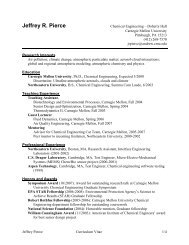1996 Electronics Industry Environmental Roadmap - Civil and ...
1996 Electronics Industry Environmental Roadmap - Civil and ...
1996 Electronics Industry Environmental Roadmap - Civil and ...
Create successful ePaper yourself
Turn your PDF publications into a flip-book with our unique Google optimized e-Paper software.
Appendix J<br />
254<br />
150,001 to 600,000 1060 500<br />
above 600,001 1600 1000<br />
1 Office equipment, copiers, facsimiles, workstations, printers<br />
2 Personal computers, workstation peripherals<br />
The compulsory fee must be openly <strong>and</strong> separately displayed on all price lists <strong>and</strong> invoices, <strong>and</strong><br />
no discounting is allowed. Participating companies manage the pre-payment fee revenue, with<br />
guidelines developed by SWICO on the kind of expenditures that companies can bill to their prepayment<br />
accounts. External auditors, on behalf of the signatories, must guarantee to the public<br />
that guidelines are observed. Semi-annually, participating companies contribute 2% of the prepayment<br />
fees to SWICO for system administration, <strong>and</strong> to cover the cost of recycling nonmember<br />
equipment.<br />
France, Germany, <strong>and</strong> the Netherl<strong>and</strong>s: Shared Responsibility Proposals<br />
After several years of study <strong>and</strong> negotiation with their Ministries, the French, German, <strong>and</strong> Dutch<br />
electronic industry associations propose “shared responsibility” models for electronics<br />
disposition. Under these models, responsibility for the collection <strong>and</strong> processing of used<br />
electronic equipment would be shared by the chain of actors in the product life cycle, including<br />
product manufacturers, retail outlets, municipal authorities, <strong>and</strong> the waste management industry.<br />
The proposals strongly argue for the continued role of municipalities as the principal entities for<br />
the collection of electronic goods, rather than establishing an independent industry-financed<br />
infrastructure. These municipal-based systems are intended to preserve <strong>and</strong> augment the current<br />
collection infrastructure, which provides collection points close to households <strong>and</strong> is familiar to<br />
consumers, in order to ensure a high level of product returns. Under contract with municipalities,<br />
the waste disposal/recycling industry would be responsible for the environmentally-sound<br />
processing of equipment <strong>and</strong> for ensuring adequate capacities. Certification of recycling firms<br />
<strong>and</strong> reporting systems (e.g., of recycling rates) would provide increased assurance of<br />
environmentally-sound recycling.<br />
The expressed role of manufacturers in electronics disposition is two-fold:<br />
1) The design of new products to reduce waste generation, avoid harmful substances, <strong>and</strong><br />
enhance recyclability at end of product life; <strong>and</strong><br />
2) Information dissemination to customers <strong>and</strong> recycling firms to help ensure appropriate<br />
disposition.<br />
In Germany <strong>and</strong> the Netherl<strong>and</strong>s, industry proposes that consumers should pay for disposal at the<br />
end of product life, if needed, or municipalities should bear the cost through an increase in<br />
annual waste assessments to households. In Germany, industry proposes different financing<br />
mechanisms based on the size of the electronic equipment. For large electrical appliances <strong>and</strong><br />
consumer electronics, municipalities could charge consumers a separate recycling fee, while no<br />
fee would be charged for small goods that fit in the trash bin (i.e., can be hidden in the trash).<br />
<strong>Industry</strong> proposes that municipalities assess each household an additional DM 15 (about U.S.<br />
$10) annually in their waste bills to cover the recycling costs for these small goods. Estimated






